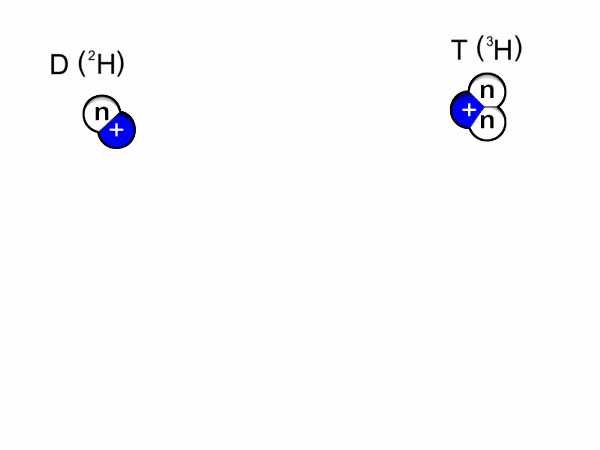
Nuclear power and energy never captured my imagination. However, in principle the topic is simple to understand, and just needs to be broken down a bit to make sense. It is also very relevant, often crops up in the news, and relies on several other key areas of physics, making it a good topic to know a bit about!

 Nuclear fusion is a nuclear reaction. It involves forming a heavier substance from two lighter ones. The reaction itself involves nuclei - the central part of an atom (def). Two lighter nuclei smash together and form a larger one, as shown in the animation to the right.
Nuclear fusion is a nuclear reaction. It involves forming a heavier substance from two lighter ones. The reaction itself involves nuclei - the central part of an atom (def). Two lighter nuclei smash together and form a larger one, as shown in the animation to the right.
The mass of this larger nucleus that is formed is not just the total mass of the two lighter ones, as some mass is transformed into energy (as described by Einstein's famous equation) - nuclear fusion generates energy. The two nuclei cannot always simply combine, and so there are other by-products of the reaction (see the animation to the right as an example).
Why does fusion release energy?
Credit to youtube user digitalcircuit36939 for the nuclear fission animation.
Nuclear fission (the breaking up of atoms) is the reaction used in power stations to produce energy. To break a nucleus apart, we need to put energy in to separate the bonds formed between the protons and neutrons. Because of this, for fission to produce energy the total binding energy (def) of the resulting elements must be greater than that of the original nucleus - i.e., the amount of energy needed to break the nucleus apart must be less than the energy we will gain from breaking it.
So, why do binding energies change if each nucleus is made up of the same 'stuff'? Well, it's to do with the fundamental forces acting on the component nucleons (protons and neutrons) in the nucleus. Find out why fission is only worthwhile for certain elements.
Although both fission and fusion can have roles in atomic weaponry (e.g. the atomic bomb), it is fission that is more often associated with this type of nuclear power use. The temperatures and pressures sustained within a hydrogen bomb for instance can briefly maintain periods of fusion.
For a visual idea of what happens during fission, the youtube video above is worth watching.

Nuclear energy is quite contentious topic. After the number of nuclear-related incidents across the world, many countries are wary of using it as a source of energy. Opinion is split following several high-profile nuclear incidents.
In the UK, nuclear power generates about 1/6 of our energy. We operate 16 nuclear reactors based at 9 plant locations, plus a nuclear reprocessing (def) plant. In 2010, the Government agreed to back the construction of several new plants. However, this support was undermined earlier in 2012 when two major energy suppliers pulled out of the development plans. Scottish parliament has refused the possibility of new nuclear plants being built in Scotland. The future of UK nuclear power is therefore very uncertain.
What about other countries?


